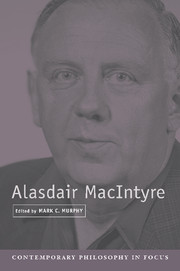Book contents
- Frontmatter
- Contents
- List of Contributors
- Introduction
- 1 Maclntyre on History and Philosophy
- 2 Tradition in the Recent Workof Alasdair MacIntyre
- 3 MacIntyre in the Province of the Philosophy of the Social Sciences
- 4 Modern(ist) Moral Philosophy and MacIntyrean Critique
- 5 MacIntyre and Contemporary Moral Philosophy
- 6 MacIntyre's Political Philosophy
- 7 MacIntyre's Critique of Modernity
- Bibliography
- Index
1 - Maclntyre on History and Philosophy
Published online by Cambridge University Press: 09 November 2009
- Frontmatter
- Contents
- List of Contributors
- Introduction
- 1 Maclntyre on History and Philosophy
- 2 Tradition in the Recent Workof Alasdair MacIntyre
- 3 MacIntyre in the Province of the Philosophy of the Social Sciences
- 4 Modern(ist) Moral Philosophy and MacIntyrean Critique
- 5 MacIntyre and Contemporary Moral Philosophy
- 6 MacIntyre's Political Philosophy
- 7 MacIntyre's Critique of Modernity
- Bibliography
- Index
Summary
In An Autobiography, R. G. Collingwood writes:
The Oxford philosophical tradition insisted upon a fine training in philosophical scholarship. Under the reign of ‘realism’ this tradition certainly survived but it weakened year by year. When I myself examined in the middle 1920's I found that very few candidates showed any first hand knowledge of any authors about whom they wrote ⃜ This decline in philosophical history was openly encouraged by the ‘realists’; it was one of their most respected leaders who, expressly on the ground that the ‘history’ of philosophy was a subject without philosophical interest, procured the abolition of the paper so entitled in the school of Philosophy, Politics and Economics.
During the war … I set myself to reconsider this ‘realist’ attitude towards the history of philosophy. Was it really true, I asked myself, that the problems of philosophy were, even in the loosest sense of that word, eternal? Was it really true that different philosophies were different attempts to answer the same questions? I soon discovered that it was not true; it was merely a vulgar error, consequent on a kind of historical myopia which, deceived by superficial resemblances, failed to detect profound differences.
For Collingwood to convince those locked in this historical myopia otherwise, however, was not an easy matter, because of the readiness with which they argued in a circle.
It was like having a nightmare about a man who got it into his head that trireme was the Greek for ‘steamer’, and when it was pointed out to him that descriptions of triremes in Greek writers were at any rate not very good descriptions of steamers, replied triumphantly, ‘That is just what I say. […]
- Type
- Chapter
- Information
- Alasdair MacIntyre , pp. 10 - 37Publisher: Cambridge University PressPrint publication year: 2003



